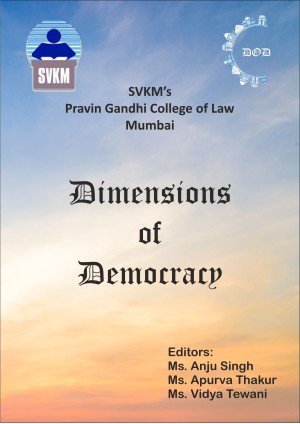Dimensions of Demography
ISBN :978-93-91044-091
Published By :Imperial Publications
Language :English
Edition :2022
No of pages :231
Binding :softbound
Democracy,
as a founding philosophy of governance draws its strength from a stratum of
guiding principles that include people's participation, rule of law, equality,
justice, and inclusivity. It has to its credit the devolution of power, consensus
in law-making, right before might, diversity, and the liberty of an individual
to change and challenge its instrumentalities. The onset of the Covid-19
pandemic brought forth more relevant issues: State power and individual
liberty; free speech and fake news; right to livelihood and State capacity to
direct private enterprises in matters of wage payment; role of courts and
access to justice. The concept of
democracy is central to our contemporary political lexicon, yet any consensus
on how to conceptualize democracy is far from widespread. Not limited to the
spectacle of elections, the idea of democracy has more at stake than party
agendas and manifestos. Though in its nascent stage, democracy, as a founding
philosophy of governance and people’s participation, has been changing the
dynamics of power, politics and all that lies in-between. Today, we need
deliberations on the various theories and models of democracy. We need to
engage in a discourse on the defining the varied constituents of democracy.
In our commitment to ideals of excellence aimed at
inculcating in our students the habit of critical inquiry to enable them to
become participants in global discourses with academic maturity and research
ability, through this conference, we sought to create opportunities for our
students – future lawyers – to immerse themselves in reflections on the very
foundation of democracy. The purpose of the conference was to facilitate a
dialogue to explore the conceptual foundations and practical ramifications of
the several aspects of democracy. Meanwhile, notwithstanding the setback of the
pandemic-driven communication breakdowns, as the world of academic was still
grappling with the unprecedented challenges, we succeeded in having on board
some of India’s leading voices on democracy, connecting with the world through
effective platforms for a seamless gathering of legal luminaries from across
the nation. We wish to thank and appreciate the willingness of our
participants, guests, and all the august speakers for their cooperation to
adapt to the new, unforeseen modes of connecting and conferencing.
I would like to take this opportunity to laud the unmatched
efforts of the institution, the organizing faculty, and the student-editorial
body for the success and extend my heartiest wishes for all future endeavors at
the institution.

